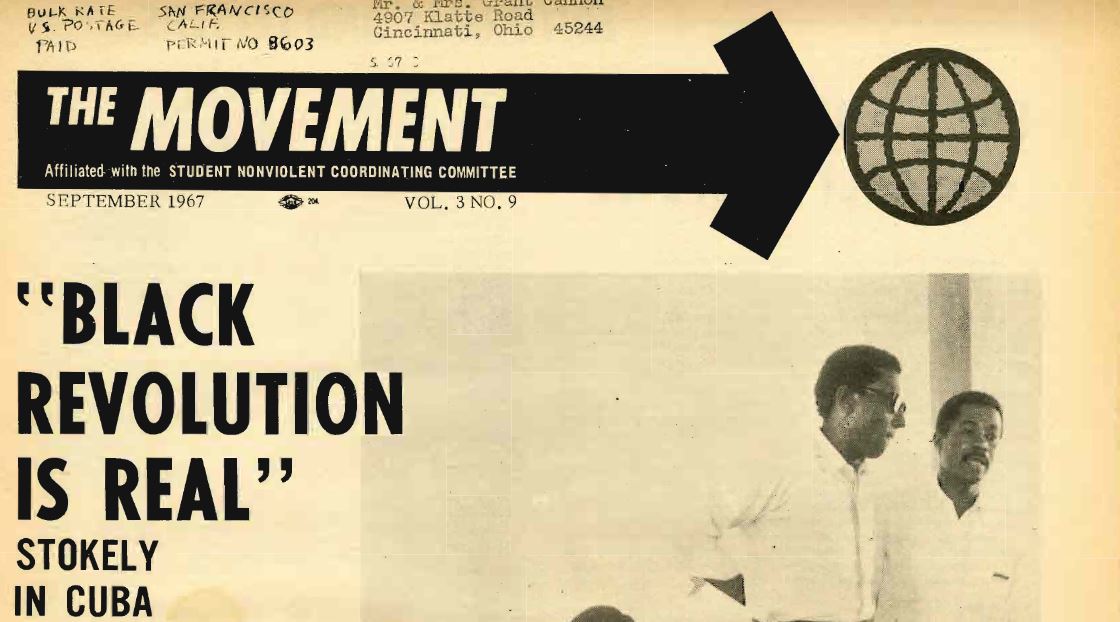A final-seven finalist in the 2018 Trinity College Dublin and developmenteducation.ie Development Issues series, Grace McGinnis looks at the Black Power Movement in the United States, and beyond.

The Black Power Movement, although overshadowed by its stance on gun ownership and self-defense strategies, was incredibly involved in the international community. Specifically, it was centered around the ‘Black struggle’ whether that be in the United States or abroad.
Those involved in the Civil Rights Movement and the movement for Black Power were well aware of the people facing inequality and poverty around the world. Student Nonviolent Coordinating Committee (SNCC), a prominent student activist organization during the 1960s, was adamant about its members travelling to the ‘Third World’ to see the struggle that exists there.
Those involved in the Black Power movement and thus, a part of SNCC, felt that understanding the causes and effects of development efforts in these countries would help to expand their organisation. It was said that if they could have continuous contacts with many countries in Asia, Africa, and Latin America, then they would have a greater understanding of their own struggle in America. This idea became of pillar for the Black Power movement; they wanted to liberate all Black people and not just those living in the United States.
Many members of such  organisations travelled to places like Tanzania and Cuba to experience the people and the politics. The Black Power Movement made many claims about colonialism in the continent of Africa. SNCC had an international focus and thus had strong foreign policy ideas. They opposed the Vietnam War, they stood in solidarity with Palestine, and they also supported the socialist revolution in Cuba. As said in a SNCC bulletin in 1966:
organisations travelled to places like Tanzania and Cuba to experience the people and the politics. The Black Power Movement made many claims about colonialism in the continent of Africa. SNCC had an international focus and thus had strong foreign policy ideas. They opposed the Vietnam War, they stood in solidarity with Palestine, and they also supported the socialist revolution in Cuba. As said in a SNCC bulletin in 1966:
“…we applaud SNCC for recognising that the enemies of deep-seated social change at home are the enemies of revolution abroad, and for acting to forge alliances with the oppressed in the Third World.”
This idea of aligning with the oppressed and understanding the connection between the United States and ‘Third World’ nations were central to the movement for Black Power. Often this understanding of development and the people of the ‘Third World’ became a point of discussion within the organisations that promoted the ideas of Black Power. These organisations chose to educate people on the politics of nations such as, Guatemala and South Africa. They spoke about the involvement of the United States in the development of these nations.
SNCC also spoke very candidly about the situation in Cuba. In 1967, members of the Committee travelled to Cuba to better understand the situation there. They were going to learn about the political structure within Cuba and how it was affected the Cuban people. They were pleasantly surprised by the quality of life in Cuba and the way in which Cuba was handling health care and literacy. The members that visited Cuba decided that the racism that existed there was a residual effect of the United States involvement in the Caribbean. They concluded that American intervention hindered development and ultimately allowed for constructs like racism to flourish. SNCC said:
“We were opposed to the exploitation of peoples around the world, especially people of the Third World by the United States. And just as we would be opposed to the war in Viet Nam, we would also be opposed to American intervention in the Dominican Republic, or American intervention in Bolivia, of which there is very much and in Guatemala and in many other places in Latin America.”
SNCC, which was an organisation centered on racial justice and the fight for civil rights in the United States became a centre for foreign policy and revolution in the late 1960s. The people of this Committee understood the importance of development in the context of the ‘Third World’ because they felt that they could not succeed if there were people in other nations facing a similar struggle. They spoke about capitalism and imperialism which were issues that plagued their very fight against racism.
These are problems that are still prevalent and are often found in discussions about development and democracy. The Black Power movement, although over 50 years ago, addressed ideas that are still incredibly relevant and are often at the center of debate within political science.
- Feature photo: frontpage, The Movement, September 1967, vol 3 no.9
- Badge graphic: Zinn Education Project

Development Economics – Question What you Read
What does it mean to critically engage with what you read and why does it matter? Emily Ramsay investigates microfinancing in development economics – the good, the bad and the neoliberal
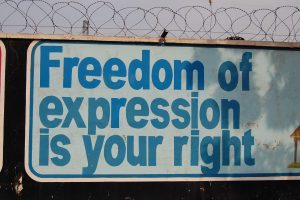
The Expression Recession
From the 2019 Trinity College Dublin Development Issues Series Final Five, Ronan Daly explores the erosion of freedom of expression and the potential subsequent impacts
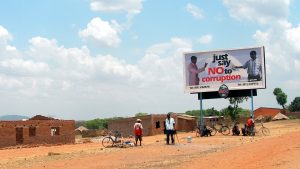
Corruption Redefined
Conor O’Brien, a 2019 Trinity College Dublin Development Issues Series Final Five finalist, explores corruption in its many guises.
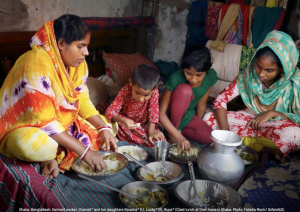
Dress For Success: Supporting the Sustainable Development Goals Through The Adoption of Ethical Shopping Habits
From the 2019 Trinity College Dublin Development Issues Series Final Five, Emma Beatty dresses for success with her Sustainable Development Goals shopping skills and takes on fast fashion.

How your favourite Instagram Influencers are Contributing to Global Inequality
The winning blog entry for the 2019 Trinity College Dublin Development Issues Blog Series is Moya McDermott on the true cost of fast fashion indulgences
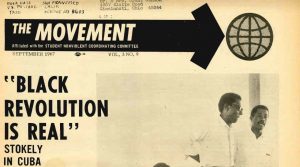
Understanding Development within the Black Power Movement
A final-seven finalist in the 2018 Trinity College Dublin and developmenteducation.ie Development Issues series, Grace McGinnis looks at the Black Power Movement in the United States, and beyond.

